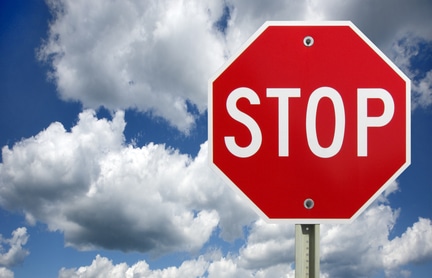We all want to be more effective and efficient but we’re often so mired down in the details and routine of our days that we don’t catch the things we’re doing that gobble valuable time and don’t
add value.
Jim Collins, author of Good to Great touts the concept of creating a “Stop Doing” list. He says one key decision about what to stop doing can have as much impact as five new initiatives.
Here are some suggestions for your Stop Doing List.
Stop being a perfectionist
Perfectionism makes us spend more time than necessary on a task. We wait for the perfect moment to get something done and when the perfect moment arrives, we’re too late. We miss the big picture while focusing on small things.
Start setting priorities
Working a full day shouldn’t mean doing as much as possible in the sanctioned eight hours. Do you really need those 30 tasks on your To Do list? Take a ‘less is more’ approach and focus on accomplishing the things that really matter.
Follow the 80/20 rule
Only 20% of what you do each day produces 80% of your results. Eliminate the things that don’t matter in your workday—they have minimal effect on your overall productivity. For example, break your next project into steps and systematically remove tasks until you end up with the 20% that gets 80% of the results.
Outsource—expand your staff without the overhead
There are a plethora of internet experts available when you’re looking for someone to complete a project or perform a specific task. A few are: Odesk (I contracted a computer expert from Odesk when I wanted to customize fields in SalesForce.com and import data from another CRM program). Elance.com (A friend engaged a researcher from Elance when he needed data for a business report he was writing.). One of my roundtable members has a virtual assistant in India and found him through GetFriday. For $125 (10 hours) a month her assistant (a college graduate) researches projects, updates websites and reminds her when it’s time to do her invoicing.
Tackle your challenging tasks before lunch
Knock out your most challenging work when your brain is fresh. If you have busy work or meetings, try to save them for the afternoon. By scheduling your day this way you’re managing your time more productively
Improve your email etiquette
Email is a productivity killer and usually a distraction from tasks that actually matter. Checking your email every 10 minutes stops you from getting into your “flow” as you’re constantly interrupting yourself. You become reactive and set up a system in which you’re at other people’s beck and call—they know you will get back to them pronto, so they keep asking.
Get into a new habit of only checking emails two or three times a day, at set intervals—maybe first thing in the morning, lunchtime and before you head home at the end of the day. Only you can determine that frequency, but the important thing is to stop making yourself a slave to your email. Oh, and turn off those pesky email alerts that flash on your screen and those little bells that ding. They make it nearly impossible to change this habit.
Stop Multitasking!
It doesn’t work. Science has proven it and you’ll always be one step short of your A Game unless you train yourself to focus on and complete the “one task” you are working on. Try it today and see how it feels; start with a small window of time, maybe 30 minutes and continually work to build-up your muscles. Eventually micro-switching, will become a bad habit of the past.
You won’t become more productive overnight. Like everything worthwhile in life, it requires practice, perseverance and focus. Give it a try, I know you can do it.

